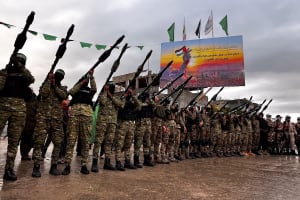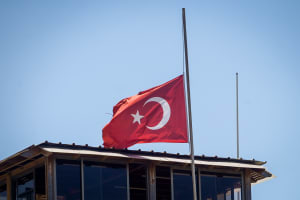Israel and its Gulf Arab neighbors form united front against Iranian threat
IDF Chief of Staff Lt.-Gen. Aviv Kochavi also addressed the INSS conference on Tuesday, saying among other things that he is ordering the military to update plans to strike Iran’s nuclear facilities

Top speakers at the Institute for National Security Studies (INSS) 14th annual international conference this week agreed that a united front against the rising threats from Iran was absolutely essential.
INSS is one of Israel's most prestigious security and geopolitical affairs think tanks. The opening panel was moderated by INSS Director General (ret.) Amos Yadlin and included Israel’s Foreign Minister Gabi Ashkenazi, Bahraini Foreign Minister Abdullatif bin Rashed Alzayani and the United Arab Emirates Minister of State for Foreign Affairs Anwar Gargash.
“A joint regional position on these issues will exert greater influence on the United States,” Alzayani said. “We must respond to Iran’s missile program, its support for proxies in the region, and its interference in the domestic affairs of states across the region, in order to bring about a broader peace and stability for the Middle East. Any future agreement with Iran will need to reflect the new reality in the region and be acceptable to all states in the region.”
Gargash spoke of the glaring errors in the Iran nuclear deal, including the fact that it was negotiated by the global powers while completely ignoring attempts by Iran’s Middle East neighbors to voice their concerns about it. Notably, Iran has listed as a condition of new negotiations the pre-condition that this state of affairs continue.
Ashkenazi, for his part, agreed that the normalization agreements between Israel and its Gulf Arab neighbors strengthened the united front against Iran, but urged a “professional dialogue” with Western powers, especially the U.S., which would avoid public bickering in the press.
The statements came amid reports that the new Biden administration in the U.S. has already entered into talks with Iran with the aim of re-joining the 2015 Joint Comprehensive Plan of Action, an agreement ostensibly meant to reign in the Iranian military nuclear program. Former U.S. President Donald Trump withdrew America from the agreement in 2018 and Iran has violated its provisions several times since then, ignoring pleas for restraint from the U.K., France, Russia, China and Germany, which were also signatories to the JCPOA.
Meanwhile, IDF Chief of Staff Lt.-Gen. Aviv Kochavi also addressed the INSS conference on Tuesday, saying among other things that he is ordering the military to update plans to strike Iran’s nuclear facilities. He added that he believes plans for the US to return to the 2015 version of the JCPOA, or even a “slightly improved” iteration of it, would be a very bad idea.
He gave his assessment that Iran could easily break out to a deployable nuclear weapon in 2030, as soon as the JCPOA expires, if it continues on the current trajectory. Therefore, he concluded, what is necessary is for the U.S. and others to maintain the “maximum pressure” campaign that the Trump Administration put in place, including economic sanctions which are close, in Kochavi’s assessment, to breaking Iran’s ability to continue defying the international community.

The All Israel News Staff is a team of journalists in Israel.














